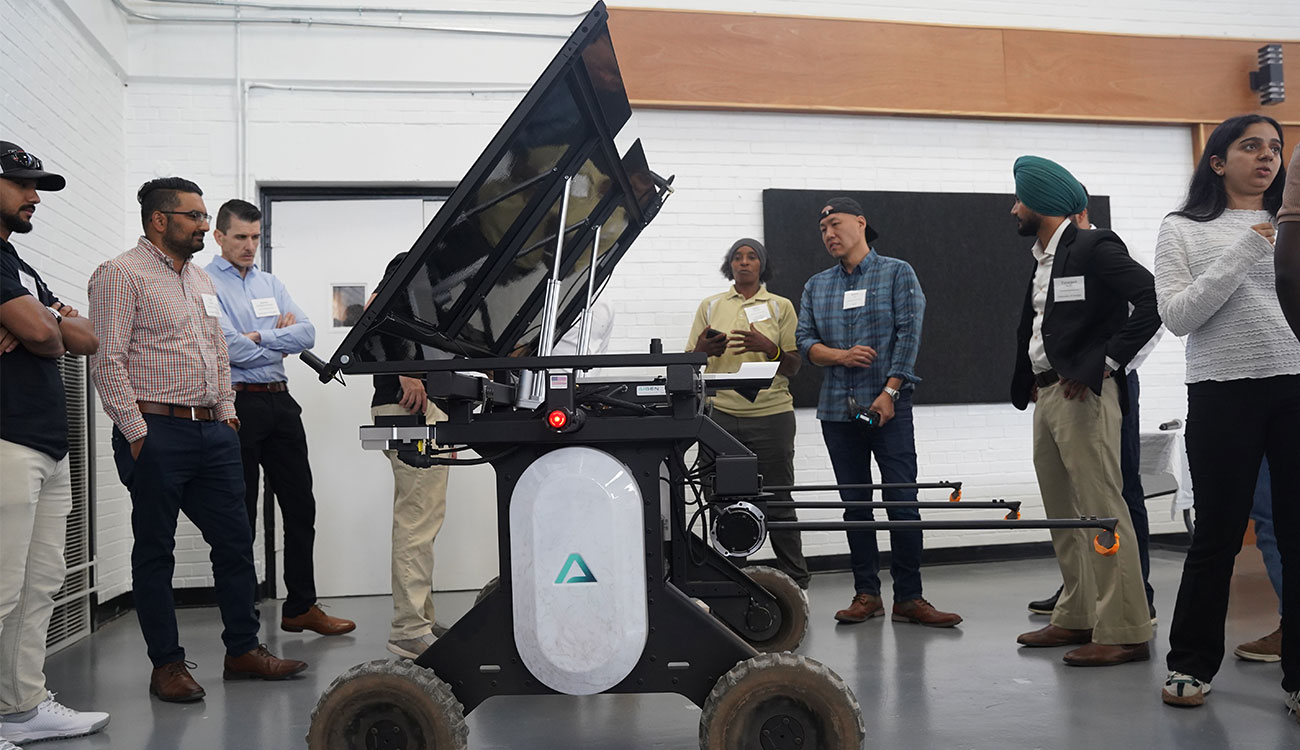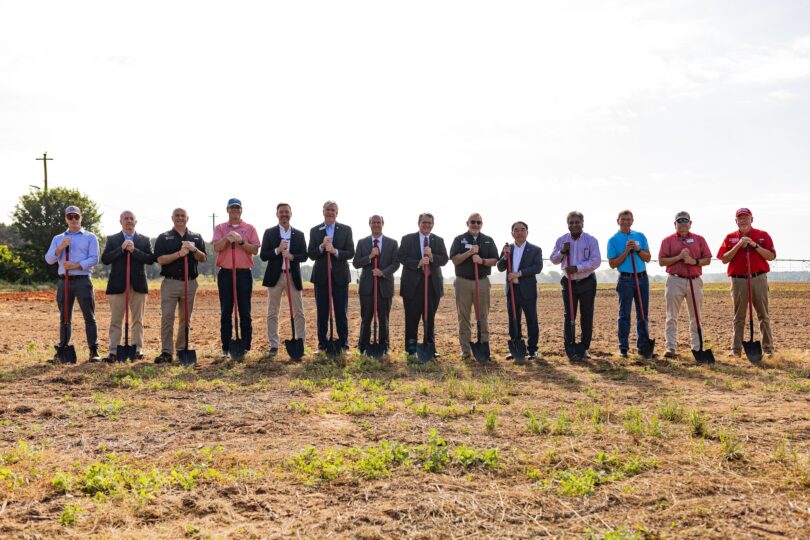Georgia oilseed farmers hope a new-generation cooperative for
oilseeds will help them bring money and jobs into rural Georgia.
The co-op is now in the early stages of development.
The co-op will market oilseed (canola, soybean, cotton and
peanut)
products to grocery or other retail outlets. A meeting for
farmers
interested in the co-op is scheduled May 3 at the Georgia Farm
Bureau building in Macon, Ga.
"This will bring the farmers a greater dollar value and
infuse
jobs and money into Georgia's rural economy," said Randy
Hudson, coordinator of the Emerging Crops and Technologies Center
of the University of Georgia College of Agricultural and
Environmental
Sciences.
And the Study Says
A UGA CAES study funded by the governor's office says such a
facility
could be built and economically supported in Georgia. The
crushing
and refining facility would primarily convert seeds from canola
and soybeans into oils. But it could handle cotton and peanuts,
too.
To get the facility up and running, according to the study, would
cost about $56 million. However, it would add about $172 million
in economic activity to the Georgia economy.
Running the facility at full capacity would take about 250,000
acres of oilseed, said George Shumaker, a UGA Extension Service
economist. Besides the 53 jobs it would create directly, about
1,100 jobs would be created indirectly, mostly in rural
Georgia.
Domestic Market
Battle
Most of the canola used in the United States comes from Canada.
This new facility will help Georgia farmers compete for the
domestic
canola market, Hudson said.
Canola oil is the preferred oil for many uses because it doesn't
change the taste of food, Hudson said. It's used for home
cooking,
bakeries and salad oils, and some restaurants fry foods with
it.
Forming a farmer-owned canola facility in Georgia would have
little
effect on the price of canola oil for consumers, Shumaker
said.
But farmers will have to come together for such a facility to
work, said Marty McLendon, a Calhoun County farmer who has grown
canola in the past.
Independent Together
"We want to remain individuals, but we have to be
independent
together," McLendon said. "We have to have a large
number
of growers join forces and get a supply large enough that we can
have a stable supply on the grocery store shelf. That's the only
way we're going to survive farming.
"If we can get a plant or processing facility to let the
farmers gain more control in the marketplace," McLendon
said,
"it's got very good potential. We've got to get a market
established. That's the main holdback for the expansion of
canola."
Growing and selling canola won't turn around the current farm
crisis "by any means," McLendon said. "We can't
grow enough to do that. But it would be another tool in the
diversity
of agriculture. (It) gives us something else to work
with."
Published on 04/26/01
Farmers to Meet on Proposed Oilseed Co-op
Brad Haire is the former news editor with the University of Georgia College of Agricultural and Environmental Sciences.
Experts/Sources:
 CAES News
CAES News
Buell, Perez elected to National Academy of Sciences
05/07/25 Olivia Randall
news.uga.edu
University of Georgia professors C. Robin Buell and Daniel R. Perez have been elected to the National Academy of Sciences, the organization announced on April 29. Members are elected to NAS in recognition of their distinguished and continuing achievements in original research. Membership is a widely accepted mark of excellence in science and is considered one of the highest honors a scientist can receive.
 CAES News
CAES News
Integrative Precision Agriculture Conference showcases the future of farming
05/06/25 David Mitchell
research.uga.edu
It’s a Thursday morning in the Perry Events Center, a high-ceilinged, white-walled open room that used to serve as an armory. It’s filled with just shy of 150 attendees of the second Integrative Precision Agriculture Conference hosted by the University of Georgia’s Institute for Integrative Precision Agriculture.
 CAES News
CAES News
UGA Grand Farm breaks ground in Perry, Georgia
05/05/25 Jordan Powers
news.uga.edu
The University of Georgia College of Agricultural and Environmental Sciences and North Dakota-based Grand Farm came together Friday to break ground on the University of Georgia Grand Farm, an agriculture innovation partnership in Perry, Georgia. UGA President Jere W. Morehead, Georgia Department of Agriculture Commissioner Tyler Harper, Georgia Sen. Larry Walker, Grand Farm Ecosystems Director Andrew Jason and CAES Dean and Director Nick T. Place addressed the crowd of more than 200 attendees.
 CAES News
CAES News
Three graduate researchers honored in 20th year of E. Broadus Browne Awards
05/01/25 Sean Montgomery
For the 20th consecutive year, the University of Georgia College of Agricultural and Environmental Sciences hosted the prestigious E. Broadus Browne Research Awards competition, resulting in three new graduate students being honored for their outstanding efforts in research and communication. In recognition of former Georgia Agricultural Experiment Station Director Edmund Broadus Browne, the annual competition highlights some of the best graduate research from departments within the college and challenges contestants with an oral presentation.
 CAES News
CAES News
UGArden celebrates 15 years of growing community, fighting hunger
04/30/25 Makenna Grace Reavis
The UGArden student farm will celebrate 15 years of service to the Athens community this spring with two major events: a Community Day on May 3 and an upscale Garden Gala on June 7. UGArden is a 10-acre student-run farm at the University of Georgia that produces organic produce through sustainable practices. The farm provides fresh food to Athens-area families, conducts research and offers hands-on education to students. It was founded by students in 2010 with support from the Department of Horticulture in the College of Agricultural and Environmental Sciences.
 CAES News
CAES News
Did you know you can grow: Mayhaw
04/29/25 Makenna Grace Reavis
cultivate.caes.uga.edu
Georgia, traditionally known as the Peach State, is famous for its peaches, pecans and peanuts. But thanks to its mild climate, the state also supports a variety of uncommon and exotic fruits. In a new series inspired by University of Georgia Cooperative Extension publication, “Minor Fruits and Nuts in Georgia,” we’ll highlight lesser-known fruits that thrive in Georgia and can be grown in home gardens. This month, we’re kicking things off with a tree that produces a fruit many may not know — the mayhaw.
